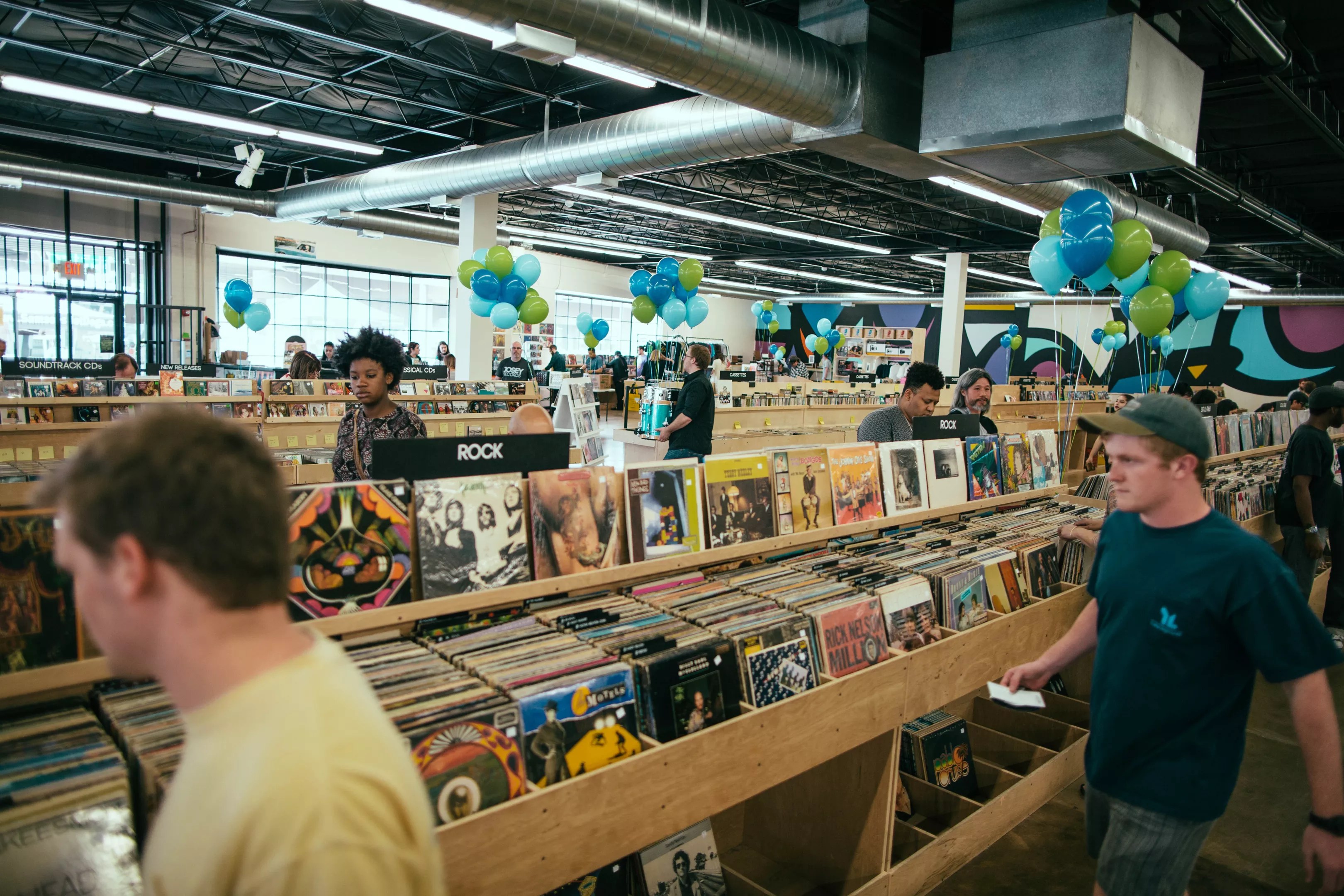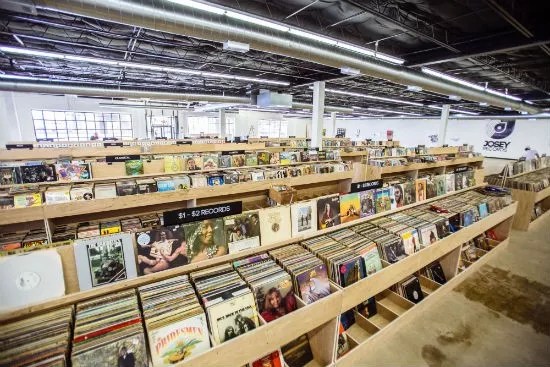
Kathy Tran

Audio By Carbonatix
Waric Cameron can always spot the first-time visitors to Josey Records.
They walk into the now-more-than-25,000-square-foot space located a stone’s throw from the dull, persistent roar of Interstate 635, take a few steps, and stop.
“Normally, I’m in the back office,” Cameron says. “But there are times where I’m in the front, and I’m doing something, I’ll see people come in the front door. … They literally take three steps in, stop, their eyes go wide. They look around – left, right. They’re not quite sure where to go. They’re in awe. ‘Where do I start?’
“If I’m up there [in front], I always kind of go, ‘Hey, is this your first time?’ And, you know, nine times out of 10, yeah, it is.”
It’s a scene that has probably played out countless times over the first decade of Josey Records’ existence.
Ten years ago this month, Cameron, who co-owns Josey Records with Luke Sardello and co-founded the store with Sardello and JT Donaldson, opened the doors to the-then-15,000-square-foot vinyl oasis in Farmers Branch, providing a carefully curated shop of immense breadth and depth, conceived by a pair of former Bill’s Records and Tapes employees.
It began as an earnest attempt to help perpetuate the legacy of connection and inspiration first felt by the generations of Dallas music lovers who frequented Bill’s over the years – its beloved proprietor Bill Wisener died in 2020 at the age of 75. “Without a doubt, there would be no Josey Records without Bill’s Records,” Cameron says. Now it has blossomed into an astonishing cottage industry of music-related projects of a scale and scope practically unequaled by any other independent record store in America.
The October 2014 opening of Josey Records’ flagship store in Dallas has spawned, to date, multiple Josey outposts in other cities and states, as far away as Missouri; the acquisition of vinyl pressing plant A&R Records; taking possession of the inventory of Bill’s Records and Tapes, which led to the expansion of the original Josey Records by another 10,000 square feet; the launch of its own record label, Skylark Soul Co., as well as a manufacturing and distribution unit, Eastwood Music Group and even a vinyl-evaluation service, Tuned In Grading.
All of that on top of the ordinary, day-to-day grind of keeping a record store’s lights on.
Indeed, the obstacles that could have prevented Josey Records, one of the largest independent record stores in the United States, from reaching its 10th birthday run the gamut from relatively pedestrian (the vagaries of retail) to the epochal-you-gotta-be-kidding-me-how-do-we-survive-this pandemic, which annihilated so many small businesses.
Yet, on Oct. 19, Josey Records will open its doors at 2821 Lyndon B. Johnson Freeway at 10 a.m. – as it does just about every Saturday – for its 10th-anniversary celebration, or as co-founder Luke Sardello describes it, “a Record Store Day-type atmosphere.”
That means live music from acts Dezorah, New Jack, M. Garland and Fawset, and DJ sets from Greg Watton and Orly Angelo, two DJs Cameron and Sardello have known for over 20 years.
There will be a photo booth, as well as snacks, games and a bar with liquor – not to mention 20% discounts on all new vinyl, 30% discounts on all pre-loved vinyl and a limited run of 10th anniversary T-shirts. (The vinyl sale runs Oct. 19-20, but the actual festivities will be Oct. 19.)
In 2013, the year before Josey Records opened its doors, vinyl record sales reached a 15-year high, selling a total of six million units in the U.S. alone. (That year’s big movers? Arctic Monkeys topped the list, followed by Daft Punk and David Bowie.)
That year also marked the sixth iteration of Record Store Day, an annual event created in 2007, in large part, to help drive traffic to independent record stores across the country. It was also a year in which Cameron and Sardello began having informal conversations – “knocking the idea around,” as Cameron puts it – about potentially opening a record store of their own.
In 2014, the vinyl retail landscape, at least in Dallas proper, primarily consisted of Good Records (then located on Lower Greenville), with mainstays like Bill’s and Top Ten Records continuing to draw loyal customers. Meanwhile, upstarts like Spinster Records (in Oak Cliff), Off the Record and Josey Records (in far north Dallas) took the plunge and opened their doors to the record-buying public.
“I don’t think we had a mission statement,” Cameron says. “We saw something that just wasn’t being provided in DFW, as far as selection and variety and sheer scale. We thought DFW is a giant metroplex: ‘Oh, Dallas is big enough to support that.'”
Sardello reaches into the pair’s past to explain the decision to open Josey: “Coming from Bill’s, I think we looked on that experience to help build what we’re building here. In its simplest form, we wanted people to feel how we felt the first time we went into Bill’s. We wanted people to come in and look around and be awestruck. And, you know, feel like they’re at home.”
In 2014, vinyl record sales totaled 9.2 million – a 52 percent increase year-over-year, and the highest total recorded since Nielsen and Soundscan began tracking music sales in 1993.
What seemed like a gamble a decade ago now looks uncannily prescient – Cameron and Sardello paddling out to catch an enormous, culture-altering wave just as it’s beginning to crest.
“Yeah, I guess it was pretty early in the [vinyl] upswing,” Sardello says. “I think we saw something happening. Waric and I have been record collectors and music lovers in general … pretty much all our lives. So, we were paying attention to what was going on.”
Cameron puts it even more bluntly: “I distinctly remember Luke calling me, going, ‘Hey, if we are going to do this, now is the time.'”
But even immense waves must, inevitably, break upon the shore. Cameron and Sardello were able to surf along the ever-growing vinyl resurgence – in 2019, 18.84 million vinyl albums were sold, generating $504 million in revenue, the most since 1988 – until the COVID-19 pandemic threatened to capsize everything.
Yet, even something as livelihood-threatening as the pandemic would turn out to be, broadly, a silver lining for Josey Records. The full-throttle and unavoidable shift to e-commerce and social media-driven interactions with customers helped the business survive – and arguably thrive – but also dramatically expanded the brand.
“Our doors were closed for a month and a half – almost two months,” Cameron says. “We had to pivot, almost immediately, and we started doing more online stuff than what we normally did, and our customers really supported us through that – they really were great.”
Attentiveness and appreciation for customers is a key component of the Josey Records experience. The flagship store, daunting in scale though it may be, has a method to its densely packed madness.
You can browse CDs in one aisle, peruse Blu-rays and DVDs on tall shelves, rifle through the bins of priced-to-move vintage vinyl in another aisle, or lose yourself in the small mountains of memorabilia salvaged from Bill’s Records, which dominates an entire corner of the store.
Whichever section a customer frequents, there almost always someone nearby to answer any questions, a human touch in the age of artificially intelligent assistance. Indeed, such a sprawling monument to the tactile pleasures of physical media is a rare specimen in this on-demand, all-digital era.
Given that scarcity, it’s not entirely surprising – and more than a little gratifying – to watch how quickly Josey Records has spread beyond North Texas. There are currently three other Josey Records stores, besides the flagship (which, incidentally, at over 25,000 square feet, stands as the largest independent record store in Texas and possibly in the country).
Still Spinning
Kansas City, Missouri (opened in 2015) and Tulsa, Oklahoma (opened in 2017) are sibling stores to Plano’s Josey Records (opened in 2023). The Tulsa location is adding 1,300 square feet to its existing space, likely in early 2025, and a fifth Josey Records is slated to open in Garland – at 1005 Northwest Highway – next month.
“We’re building that as we speak right now,” Cameron says of the Garland location. “We’ve got people over there hammering and knocking stuff down.”

Josey Records is a must when it comes to record shopping.
Kathy Tran
Once Garland opens its doors and Tulsa expands, what next? What does the next decade of Josey Records look like, particularly when standing back and considering the sizable achievements of its first decade?
It is not a question easily answered – not because Cameron or Scardello are unsure or lacking in ambitious plans to expand the Josey Records empire, but because, behind all of this explosive growth and impressive accomplishment, stand two mere mortals. The last decade has been, to put it mildly, exhausting.
“Luke and I, we talk about this a lot,” Cameron says. “We’ve worked really hard the last 10 years – almost to a fault, maybe. I, personally, in just the last year, have kind of hit a wall. I just need more balance. I’m sure Luke feels that way too.
“I know for sure we’re going to continue to hone and fine-tune Josey [Records] Dallas, and just keep delving into the legacy of Bill and all his estate ephemera. There are cities outside of Dallas that come up in conversation [about expansion] quite a bit.”
“We very much see this as kind of our legacy, too,” Sardello says. “I think we’re definitely thinking about the legacy of what Josey is beyond our lifetimes.”
At the very least, the next decade of Josey Records will undoubtedly contain many more moments of first-time visitors crossing the flagship store’s threshold – the pale wooden bins brimming with vinyl and compact discs, stretching as far as the eye can see – and stepping into the continuation of a tradition that began decades ago, when streaming services and satellite radio were sci-fi fantasies, and the only way to hear the music you loved at home was on a 12-inch plastic platter.
“We’ve been able to create these memories for people and these bonding experiences for people, and we want that to continue,” Sardello says. “We are hopeful people look back on us the same way we look back on Bill’s.”